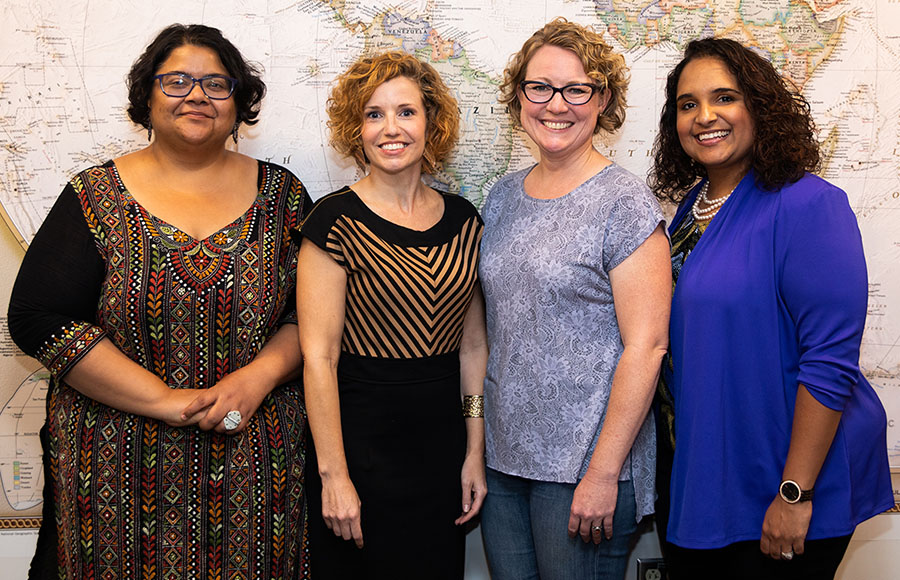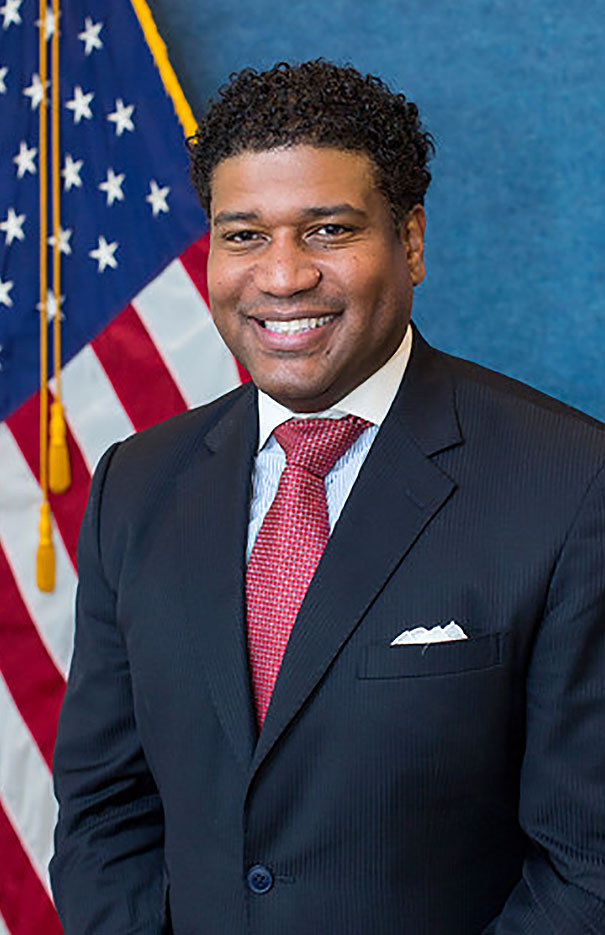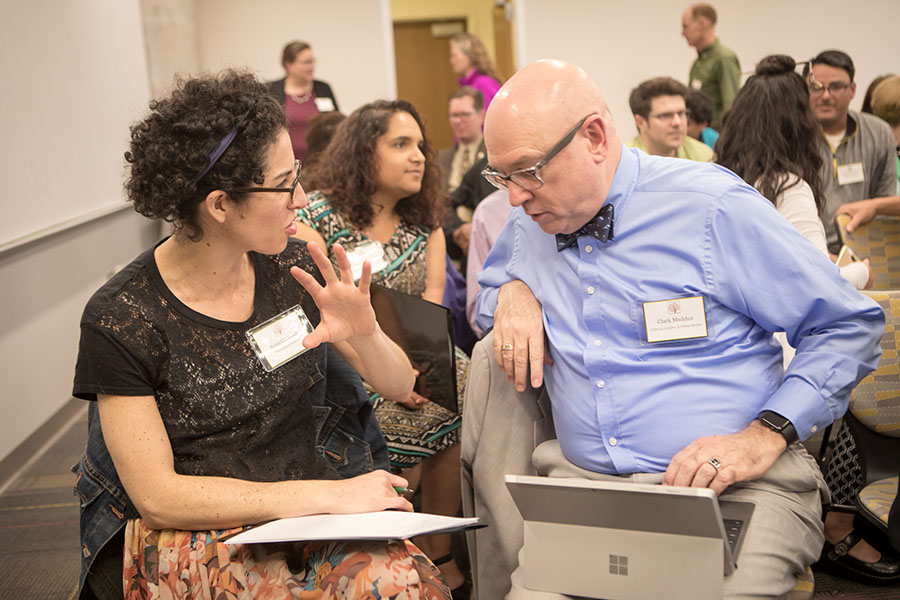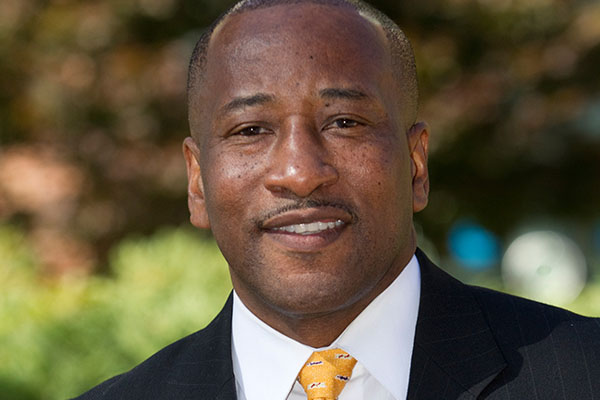A three-day residency to strengthen Appalachian’s diversity commitment by engaging our community in a conversation about diversity, equity, inclusion and change.
BOONE, N.C. — As Appalachian State University seeks to strengthen its culture of diversity and inclusion, a professional development initiative for faculty is helping make the classroom experience more welcoming for all students.
The university formed an Inclusive Excellence Team in its Center for Academic Excellence (CAE) during the 2016–17 academic year to support faculty across campus in improving their curricula and personal interactions in ways that treat diversity as a strength to be actively engaged — an intentional inclusion of the cultures, worldviews, gifts, talents, histories and traditions of all people and places.
A number of activities have been sponsored by the Inclusive Excellence Team so far, with more planned for 2018–19.
“Inclusion and academic excellence go hand in hand,” said Dr. Brandy Bryson, director of the Inclusive Excellence Team and associate professor in the Reich College of Education’s Department of Leadership and Educational Studies.
“Our overarching goal is to get faculty to become more curious and inquisitive about the ways, both small and large, that they can bring elements of equity, diversity and inclusion into their classroom and their teaching,” she said.
Bryson said the professional development is relevant to all disciplines and is not just about developing politically correct language — “It’s about larger social dynamics and language. … it’s about helping people feel they are included so that everyone succeeds academically and professionally.”
“Inclusive Excellence,” according to the CAE, employs a broad definition of diversity and acknowledges that identities shape an individual’s understanding of self and others and how people interact with one another and make policy, practice and curricular decisions. Some of these identities include the following:
- (Dis)ability.
- Gender identity.
- Gender expression.
- Sexual orientation.
- Race and ethnicity.
- Nationality.
- Age.
- Religion.
- Social class.
The Inclusive Excellence Team has been working with other units on campus — the Office of the Chief Diversity Officer, the Office of Disability Resources, the Students with Diverse Abilities Program and the Office of International Education and Development among them — to better understand various underrepresented populations’ experiences and needs to improve the learning environment for all students.
The impetus for the Inclusive Excellence Team’s work
The work of the Inclusive Excellence Team has been informed by faculty requests for professional development and curricular support in the areas of diversity, equity and inclusion, as well as data from a number of campus climate assessments conducted between 2015 and 2017.
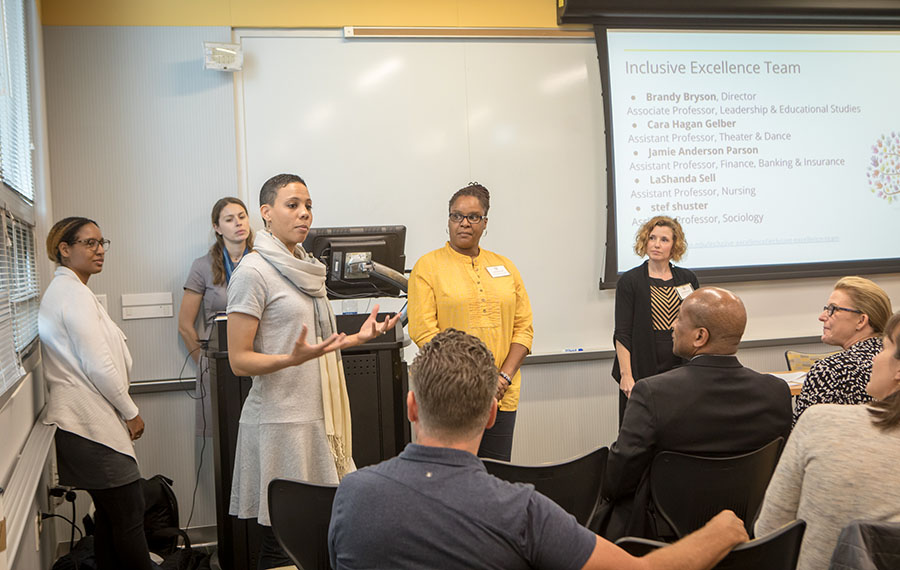
In April, members of Appalachian’s Inclusive Excellence Team speak at the Cultivating Faculty Inclusive Excellence Institute to peers who will serve as inclusive excellence liaisons between their departments and the Center for Academic Excellence. The faculty-driven initiative is designed to create more inclusive curricula and classroom dynamics. Pictured speaking is Cara Hagan of the College of Fine and Applied Arts with, from left, Dr. LaShanda Sell of the Beaver College of Health Sciences and Dr. Brandy Bryson of the Reich College of Education. Pictured in back are Sustained Dialogue Institute representatives Rhonda Fitzgerald, far left, and Elizabeth Wuerz, who helped lead the daylong event. Photo by Marie Freeman
These assessments included the formal evaluation by a University of North Carolina System consultant in partnership with Chief Diversity Officer Dr. Willie C. Fleming, research by faculty in the Reich College of Education, the former Chancellor’s Commission on Diversity and Social Justice and listening groups with underrepresented students conducted by Faculty Senate.
Data from these reports demonstrated that underrepresented students, staff and faculty experienced microaggressions, tokenizing and outcomes of unconscious bias from others on campus, Bryson said. Students also reported experiencing curricula that was not diverse in its representation.
“Academic Affairs asked me to lead professional development for faculty in partnership with Student Affairs, the Office of the Chief Diversity Officer and the Chancellor’s Office that aligns with the institution’s strategic plan,” Bryson said.
“I’m excited to support faculty in understanding how they’re already doing this work and how they can improve,” she said.
In the 2017–18 academic year, the Inclusive Excellence Team:
- Offered a two-part professional development workshop through Human Resources.
- Launched the Inclusive Excellence Liaisons program to support departmental-level progress in creating equitable educational environments.
- Hosted a daylong Cultivating Faculty Inclusive Excellence Institute in April, facilitated by the Sustained Dialogue Institute, for 48 faculty interested in representing their respective academic departments as inclusive excellence liaisons.
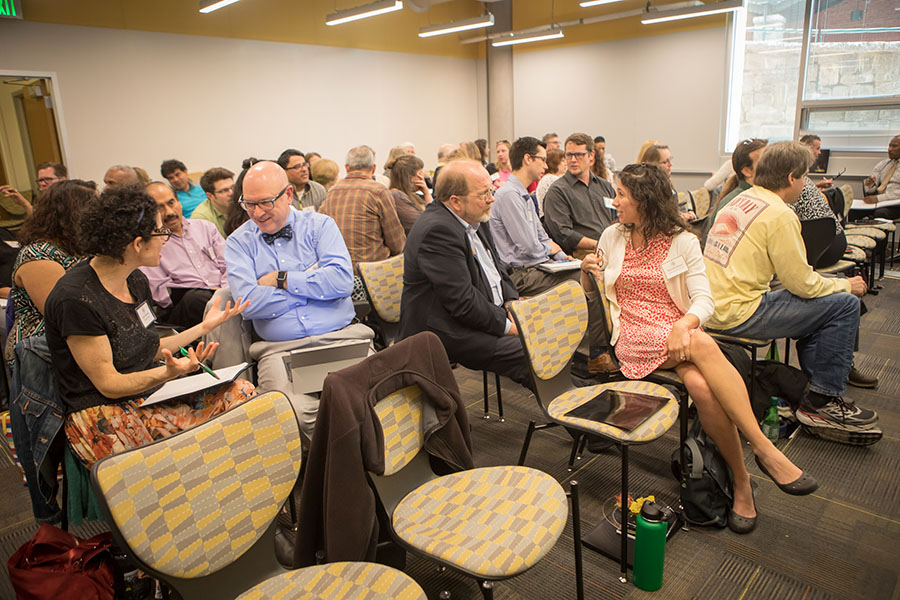
Nearly 50 faculty participated in the Cultivating Faculty Inclusive Excellence Institute last April, sponsored by the Center for Academic Excellence’s Inclusive Excellence Team. Many of the participants will serve as departmental liaisons to support the development of more inclusive curricula and classroom dynamics. Photo by Marie Freeman
Regarding the liaisons program, Bryson said the university’s academic departments are at different stages of adopting inclusive excellence, and the liaisons representing each area can help assess their progress and identify what their faculty, department and colleges need. The April institute focused on teaching the liaisons inclusive excellence language and concepts, classroom strategies and how to support underrepresented students, navigate difficult dialogue and opinions, and diversify curricula and syllabi.
“I commend and value Drs. Fleming and Bryson’s leadership of our inclusive excellence work. Their collaboration and complementary talents build on the inclusive excellence initiatives that we as a university community have purposefully fostered since 2016–2017,” said Dr. Darrell Kruger, provost and executive vice chancellor.
“Much of this work is coordinated out of the Center for Academic Excellence, which exists to serve our faculty and staff,” he said. “Engagement of faculty and staff across the length and breadth of the university as active participants with this work is essential for the success of our current as well as future students.”
What’s new for 2018–19
For 2018–19, the Inclusive Excellence Team has partnered with the Office of the Chief Diversity Officer and Division of Student Affairs on a three-day residency with inclusive excellence consultant Dr. Damon Williams Aug. 27–29. His visit includes a public address and working group sessions with deans, department chairs, faculty and others on topics such as retention of underrepresented students, faculty and staff; working through generational and culture gaps, developing measurable performance indicators; and assessing achievement and success.
The team has also enhanced the Center for Academic Excellence website with faculty resources for the new academic year:
- Best practices for diversity, equity and inclusive excellence.
- Sample syllabi statements.
- Blogs, news articles, worksheets and other resources.
- On-campus support.
Changes — such as a more diverse curricula or paragraph-long syllabi statement — become “symbolic of an attitude and practice of acknowledging underrepresented students,” Bryson said.
When faculty become more knowledgeable and confidant in how they approach diversity, equity and inclusion, Bryson said, “Students and colleagues can feel honored, lines of communication are opened and there’s an expectation of respect, equity and excellence that can permeate the fabric of the institution.”
A three-day residency to strengthen Appalachian’s diversity commitment by engaging our community in a conversation about diversity, equity, inclusion and change.
About Appalachian State University
As a premier public institution, Appalachian State University prepares students to lead purposeful lives. App State is one of 17 campuses in the University of North Carolina System, with a national reputation for innovative teaching and opening access to a high-quality, cost-effective education. The university enrolls more than 21,000 students, has a low student-to-faculty ratio and offers more than 150 undergraduate and 80 graduate majors at its Boone and Hickory campuses and through App State Online. Learn more at https://www.appstate.edu.
What do you think?
Share your feedback on this story.
